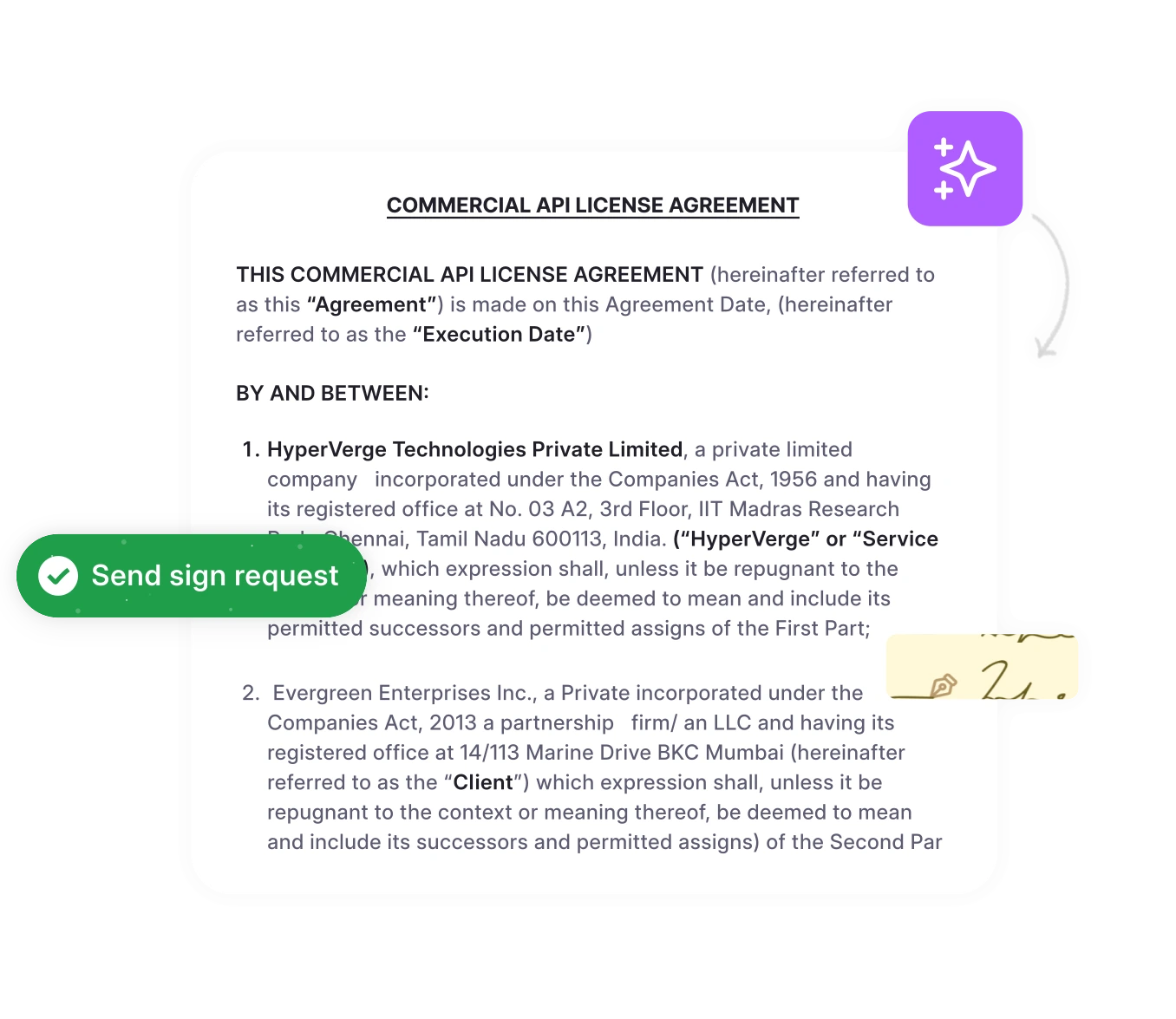Contract disputes over invalid consideration cost businesses thousands in legal fees annually. Whether you’re drafting vendor agreements, employment contracts, or service deals, understanding consideration in a contract prevents enforceability issues that derail negotiations.
Legal teams struggle with identifying adequate consideration, tracking the flow of consideration in complex agreements, and ensuring that consideration requirements meet legal standards. This comprehensive guide covers what makes consideration valid, when consideration fails, and how modern contract management addresses these challenges.
We’ll explore the essential elements of valid consideration, different types of consideration in contracts, common invalidity scenarios, legal consequences, and key exceptions.
Let’s begin.
What is consideration in a contract?
Consideration in contract law represents the bargained-for exchange of value that makes contracts legally enforceable, essentially the “price” each party pays for the other’s promise or performance. This fundamental element transforms simple promises into binding legal obligations that require mutual obligations from both parties.
According to Cornell Law School’s Legal Information Institute, consideration means the mutual exchange of promises or obligations between the parties to a contract and is a necessary element to the creation of a valid contract.
To define consideration in simple terms, it encompasses various forms of value exchange. Answering the question ‘What does consideration mean in a contract?’ requires examining these different value types.
Consideration in law encompasses various forms of value exchange:
- Money or property- Direct payment or transfer of tangible assets
- Services- Professional work, labor, or performance of duties
- Promises- Commitments to perform future actions or deliver value
- Forbearance- Agreeing not to do something one has a legal right to do
Each party’s promise must be motivated by the other party’s commitment, creating the essential bargained-for exchange. The legal definition requires this mutual inducement where both parties provide something of value. A homeowner promising $5,000 to a painter for house painting services exemplifies this example of mutual value exchange.
The doctrine that a consideration is necessary if a contract is to be enforceable has a number of functions in the law of contracts. In addition to providing evidence that a contract exists, consideration also has the cautionary function of guarding the promisor against ill-considered action; the deterrent function of discouraging transactions of questionable utility; and a channeling function of enabling interested persons to distinguish particular types of transactions.
Read
Understanding contract law principles helps legal teams identify when a lack of consideration undermines the validity of an agreement. What makes a contract legally binding depends heavily on proper consideration because promises of gifts, illusory promises, or acts fulfilling existing legal duties cannot create valid consideration.
Without proper consideration of the contract, courts refuse to enforce agreements, making this element essential for creating a valid and enforceable contract.
Read also, Consideration Clause: A Complete Guide for Legal Teams
Transform your contract tracking today
Never miss critical terms and compliance issues that put your agreements at risk.
Book a DemoWhat are the essential elements of valid consideration?
Understanding what makes a contract legally binding requires examining the specific elements of a valid contract, particularly the consideration requirements that courts scrutinize when determining the enforceability of a contract.
Valid consideration in contracts requires six fundamental elements that create the bargained-for exchange, distinguishing enforceable agreements from unenforceable promises. Understanding these elements of contract law prevents common drafting mistakes that invalidate agreements and helps legal teams structure contract consideration properly.
1. The consideration must be legal
Legal consideration cannot involve illegal activities, violate public policy, or contravene statutory requirements. The consideration must be real and lawful, not unlawful, impossible, or against public policy.
Courts refuse to enforce contracts when the legal requirements for consideration are met through criminal acts, regulatory violations, or activities that harm public welfare. For instance, consideration involving tax evasion, bribery, or the provision of unlicensed professional services renders entire agreements unenforceable.
2. The consideration must not be past or moral obligation
Past consideration contract law establishes that promises based on previously completed actions typically lack enforceability because they weren’t part of the original bargained-for exchange. If Party A already performed services and Party B later promises payment, this past consideration generally cannot support new contracts.
Similarly, moral obligations alone don’t constitute valid consideration. A promise to pay someone for saving your life, while morally compelling, lacks the bargained-for exchange required for contract consideration.
3. The consideration must be adequate but not necessarily equal
Courts examine consideration adequacy differently from consideration equality, focusing on sufficiency rather than fairness. Adequate consideration means the exchange has legal value, though it doesn’t need to be “fair” or equal in market value.
According to Thomson Reuters Legal, for consideration to be valid, there must be a bargain for the exchange. Courts will not question the validity of consideration just because a party made a bad bargain, as long as an adequate opportunity to negotiate was provided.
For example, a promise to sell a $50,000 car for $1 involves adequate consideration if both parties genuinely agreed to this exchange. However, wildly disproportionate consideration might indicate fraud, duress, or mistake requiring judicial review.
Courts are hesitant to consider whether the consideration offered was adequate, explaining that the adequacy of the consideration was for the parties to the contract to consider and decide at the time they enter into the contract; but, ‘gross inadequacy’ of the consideration might be evidence of fraud or other problems in the forming of the contract.
Read
4. The consideration must not be illusory or uncertain
Illusory promises provide no real commitment and represent invalid consideration because they don’t actually bind the promisor to any obligation. Promises like “I’ll buy your product if I feel like it” or “I’ll pay whatever I think is fair” lack the certainty required for consideration contracts.
Courts require that consideration in contract law involve definite obligations or measurable commitments. Vague promises allowing one party to escape performance without consequence invalidate entire agreements.
5. Consideration must be mutual exchange between both parties
Mutual consideration requires both parties to give something of legal value in exchange for the other’s promise. One-sided promises or gifts typically lack the reciprocal exchange necessary for consideration in contracts.
Each party’s promise or performance must be sought by the other and serve as the basis for the agreement. Even nominal consideration can satisfy this requirement if both parties genuinely intended to create legal obligations.
6. No pre-existing legal duty to perform the same obligation
Promising to fulfill existing legal obligations cannot constitute new consideration. If a contractor already owes for the completion of construction work, promising to finish that same work cannot support additional contract consideration.
This pre-existing duty rule prevents parties from extracting additional compensation for obligations they already owe. However, modification of duties or additional performance beyond existing obligations can provide legal consideration.
The following table summarizes these essential elements with practical examples to help legal teams quickly identify potential consideration issues:
| Element | Requirement | Valid Example | Invalid Example |
| Legal | Must comply with laws | Payment for consulting services | Payment for illegal activities |
| Not Past | Must be future-oriented | Promise to pay for future work | Promise to pay for completed work |
| Adequate | Must have some legal value | $1 for valuable property | Promise with no value |
| Not Illusory | Must create real obligations | “I will buy 100 units” | “I may buy units if I want” |
| Mutual Exchange | Both parties must give value | Payment for services | One-way gift promise |
| No Pre-existing Duty | Cannot be an existing obligation | Additional work beyond the contract | Work already owed under contract |
Understanding these elements helps legal teams draft enforceable agreements and contract clauses while avoiding common pitfalls that create consideration defects.
Read also: 6 Fundamental Elements of a Contract
What are the different types of consideration in contracts?
Consideration contracts utilize various forms of value exchange, depending on the timing, nature, adequacy, legality, and methods of expression. Understanding different types of contract consideration helps legal teams structure appropriate exchanges for different agreement scenarios and select the most suitable consideration form for specific business needs.
The definition of consideration encompasses multiple categories, each serving distinct contractual purposes and offering advantages for various transaction types.
| Type | Definition | Example | Timing |
| Executed | Obligations fulfilled when the contract is made | Buying a product in a store with immediate payment | Present |
| Executory | Promises for future performance | The company is paying the vendor for next month’s shipment | Future |
| Monetary | Direct exchange of money | $5,000 payment for consulting services | Varies |
| Property | Transfer of tangible assets | Land deed exchange for purchase price | Varies |
| Service | Performance of work or duties | Legal representation for an agreed fee | Future |
| Forbearance | Refraining from legal rights | Agreement not to sue for settlement payment | Future |
The table above illustrates how different consideration types apply across various contract scenarios, enabling legal professionals to select the appropriate structures for specific transactions.
1. Executory vs executed consideration
Executed consideration occurs when both parties fulfill their contractual obligations at the time the contract is made. Cash transactions exemplify executed consideration, where payment and goods exchange simultaneously – like buying a product in a store where you pay and receive the item immediately.
Executory consideration involves promises for future performance, where parties commit to deliver value after contract formation. Most business contracts use executory consideration, such as a company agreeing to pay a vendor for a shipment arriving next month. This timing distinction affects contract interpretation, performance obligations, and potential breach remedies.
2. Monetary payment and property consideration
Monetary payment represents the most common form of consideration in contracts, involving the direct exchange of money for goods or services. Property or goods consideration encompasses physical items, such as land, equipment, or inventory, transferred between parties.
These tangible forms of consideration provide clear value measurement and typically avoid adequacy disputes. Courts readily recognize monetary and property exchanges as sufficient consideration for the formation of a legally binding contract.
3. Service and promise consideration
Service consideration involves performing actions for another party, such as consulting, construction, or professional services. Promise consideration occurs when one party promises future performance in exchange for the other’s immediate value or reciprocal promises.
These consideration forms create ongoing obligations and performance expectations that extend beyond the initial contract formation period.
4. Forbearance consideration
Forbearance represents a unique consideration type in which parties agree not to exercise a legal right they have. Common examples of forbearance include agreements not to sue, not to compete, or not to disclose confidential information.
Courts recognize forbearance as a valid consideration because refraining from exercising one’s legal rights provides a valuable benefit to other parties. Settlement agreements frequently use forbearance consideration when parties agree not to pursue litigation in exchange for monetary compensation.
Understanding these considerations helps identify appropriate exchange structures across various types of contracts and transaction scenarios while ensuring proper value exchange for enforceability.
When does consideration become invalid in contracts?
Even valid consideration can become problematic under certain circumstances, rendering otherwise sound agreements unenforceable. Invalid consideration creates significant legal and business risks when the exchange of value becomes legally insufficient.
Understanding when consideration law fails helps legal teams identify problematic provisions before they cause contract dispute situations and prevent costly enforceability challenges.
Lack of consideration issues arise from several common scenarios that courts consistently refuse to recognize.
1. Past consideration scenarios
Past consideration typically cannot support new contractual obligations because it lacks the essential element of a bargained-for exchange that occurred before the promise was made. When Party A completes services and Party B later promises payment, this chronology undermines the enforceability of the agreement.
For example, if a consultant provides emergency IT services and the client promises payment weeks later, past consideration contract law generally prohibits enforcement. The services preceded any bargained exchange, eliminating the consideration foundation.
2. Pre-existing duty rule violations
The pre-existing duty rule invalidates consideration when parties promise to perform obligations they already owe. A police officer demanding payment to investigate crimes they’re required to investigate exemplifies pre-existing duty violations.
If a contractor demands extra payment to complete work already under contract, this promise lacks consideration in contract law. The contractor already owes completion, so promising the same performance cannot support new agreements.
3. Illusory promise cases
Illusory promises appear to offer consideration but actually provide no meaningful commitment, making them invalid because they don’t bind the promisor to any obligation. Phrases like “if I want to,” “at my discretion,” or “if circumstances permit” often create illusory consideration contracts.
Requirements contracts can become illusory if they don’t establish minimum purchase quantities or reasonable estimation methods. Courts examine whether promises impose genuine obligations or merely create unenforceable options.
4. Inadequate consideration and failure scenarios
Inadequate consideration occurs when the value exchanged is so minimal that courts question its validity. While courts generally don’t examine consideration adequacy, extremely disproportionate exchanges may indicate fraud or unconscionable agreements.
Failure of consideration represents situations where consideration was initially valid but becomes worthless through non-performance. Total failure occurs when a party fails to perform substantial obligations, defeating the contract’s purpose. Partial failure involves incomplete performance that doesn’t substantially defeat the agreement’s value.
Understanding these invalidity scenarios prevents breach of contract claims from arising due to consideration defects. It helps avoid complex contract dispute resolution challenges that could otherwise be prevented through proper consideration and structuring.
What are the legal consequences of failed consideration?
Failure of consideration creates significant legal consequences that can invalidate entire agreements and expose parties to financial liability. Understanding these consequences helps legal teams prevent and address consideration-related contract issues while distinguishing between different types of failure and their corresponding legal remedies.
The primary legal consequences include:
- Contract unenforceability- Courts refuse to enforce agreements with failed consideration
- Rescission rights- Parties can terminate contracts and restore pre-agreement positions
- Restitution claims- Recovery of value provided despite invalid consideration
- Defense opportunities- Failed consideration serves as breach of contract defense
- Damage calculations- Different remedies for total versus partial consideration failure
1. Contract becomes unenforceable and rescission rights
When consideration fails, courts typically refuse to enforce entire agreements, regardless of other valid contract elements. This enforceability loss eliminates legal remedies for breach and prevents parties from compelling performance through judicial action.
Contract rescission becomes available when total failure of consideration occurs, allowing parties to terminate agreements and restore positions they held before contract formation. Courts can order rescission when consideration becomes completely worthless or one party fails to perform substantial obligations.
2. Restitution and unjust enrichment claims
Even when consideration fails, parties may pursue restitution claims to recover value already provided. Courts can order unjust enrichment remedies when one party benefits from another’s performance despite invalid consideration.
Restitution focuses on preventing unfair advantage rather than enforcing contract terms. Successful restitution claims typically require proving that defendants received benefits they shouldn’t retain without compensation.
3. Defense to enforcement and damages distinction
Failure of consideration serves as a powerful defense when parties face breach of contract lawsuits. Defendants can argue that they shouldn’t perform obligations because counterparties failed to provide promised consideration.
The consequences differ significantly between total and partial failure scenarios.
→ Total failure of consideration may discharge the entire contract and excuse all remaining performance obligations.
→ Partial failure typically entitles injured parties to damages but doesn’t completely release them from their own performance duties.
Understanding these consequences guides the drafting of preventive contracts and helps develop strategies for addressing consideration defects. When consideration issues threaten the validity of an agreement, prompt legal intervention often preserves the enforceable contract status and prevents the total collapse of the agreement.
What are the exceptions to the consideration requirements?
Despite general consideration requirements, several legal doctrines allow contract enforcement without a traditional bargained-for exchange. These exceptions prevent unfair results when strict consideration law rules would cause injustice, providing alternative enforcement theories for specific scenarios.
1. Promissory estoppel doctrine
Promissory estoppel enforces promises when recipients reasonably rely on them to their detriment, even without consideration. This equitable doctrine protects parties who change position based on others’ commitments that should have been reasonably expected to induce reliance.
Promissory estoppel example: If Company A promises to lease office space to Company B, and Company B relocates employees based on this promise, courts may enforce the lease despite lacking traditional consideration. The reasonable reliance on the promise creates enforceable obligations.
Successful promissory estoppel definition applications require clear promises, reasonable reliance, and substantial detriment from non-performance. Courts examine whether promise recipients acted reasonably in trusting and relying on commitments.
2. Promises to pay discharged or time-barred debts
Promises to pay a discharged debt create binding obligations without new consideration when debtors voluntarily commit to repaying obligations that have been eliminated through bankruptcy or other legal processes. These new promises restore enforceability despite original debt discharge.
Promises to pay time-barred debt become enforceable when debtors make written commitments to pay obligations that exceed statute of limitations periods. The voluntary revival of expired legal duties creates binding obligations without requiring fresh consideration.
3. Statutory and UCC exceptions
The Uniform Commercial Code (UCC) creates several consideration exceptions for commercial transactions:
- Firm offers- Merchant offers in signed writings become irrevocable without consideration
- Contract modifications- Goods sales contracts can be modified without new consideration
- Waiver claims- Rights arising from alleged breaches can be discharged without consideration
Charitable subscriptions gain enforceability through specific state statutes that make promises to contribute to charities legally binding even without consideration. These laws recognize the public benefit of charitable commitments.
Sealed instruments (deeds) don’t require consideration for enforceability in some jurisdictions. The formal execution process substitutes for consideration requirements, making promises binding through ceremonial formality.
Read also: Commercial Contracts: A Complete Guide
4. Material benefit rule and special cases
The material benefit rule enforces promises to compensate for benefits already received, creating exceptions to past consideration restrictions. When the one who promises confers substantial benefits without expecting payment, subsequent promises for compensation may become enforceable despite timing issues.
This exception applies when emergency services, life-saving actions, or valuable assistance occur without prior agreement. Later promises to pay for these benefits can create binding obligations, particularly when the promisor was present when services were performed and the promise is in writing.
Understanding these exceptions helps identify alternative enforcement theories when traditional consideration in contract law analysis fails. Special circumstances often trigger unique contract conditions that modify standard consideration requirements and create enforceable obligations through the application of exception doctrines.
Streamline consideration tracking with HyperStart CLM
Modern contract lifecycle management transforms how legal teams identify, track, and manage consideration requirements across complex agreement portfolios. HyperStart contract lifecycle management software combines AI-powered metadata extraction with automated workflow capabilities to eliminate manual consideration oversight challenges.
Legal teams using HyperStart report faster contract processing through automated clause identification and consideration term extraction. The platform’s AI technology analyzes contract language to identify consideration elements, flag potential adequacy issues, and track consideration flow across related agreements.
Advanced contract repository capabilities enable instant searches for consideration-related clauses, helping legal teams maintain consistency across similar transactions. Automated alerts notify teams when consideration terms require modification or when agreements approach renewal deadlines.
For comprehensive details on how AI technology streamlines consideration management and other contract analysis tasks, explore our guide to AI contract management solutions.
Never miss an obligation
Tracks obligations with AI and automatically alerts teams to stay ahead.
Book a Demo











